Rising right-wing politician Nina Fehr Düsel – warm but tough
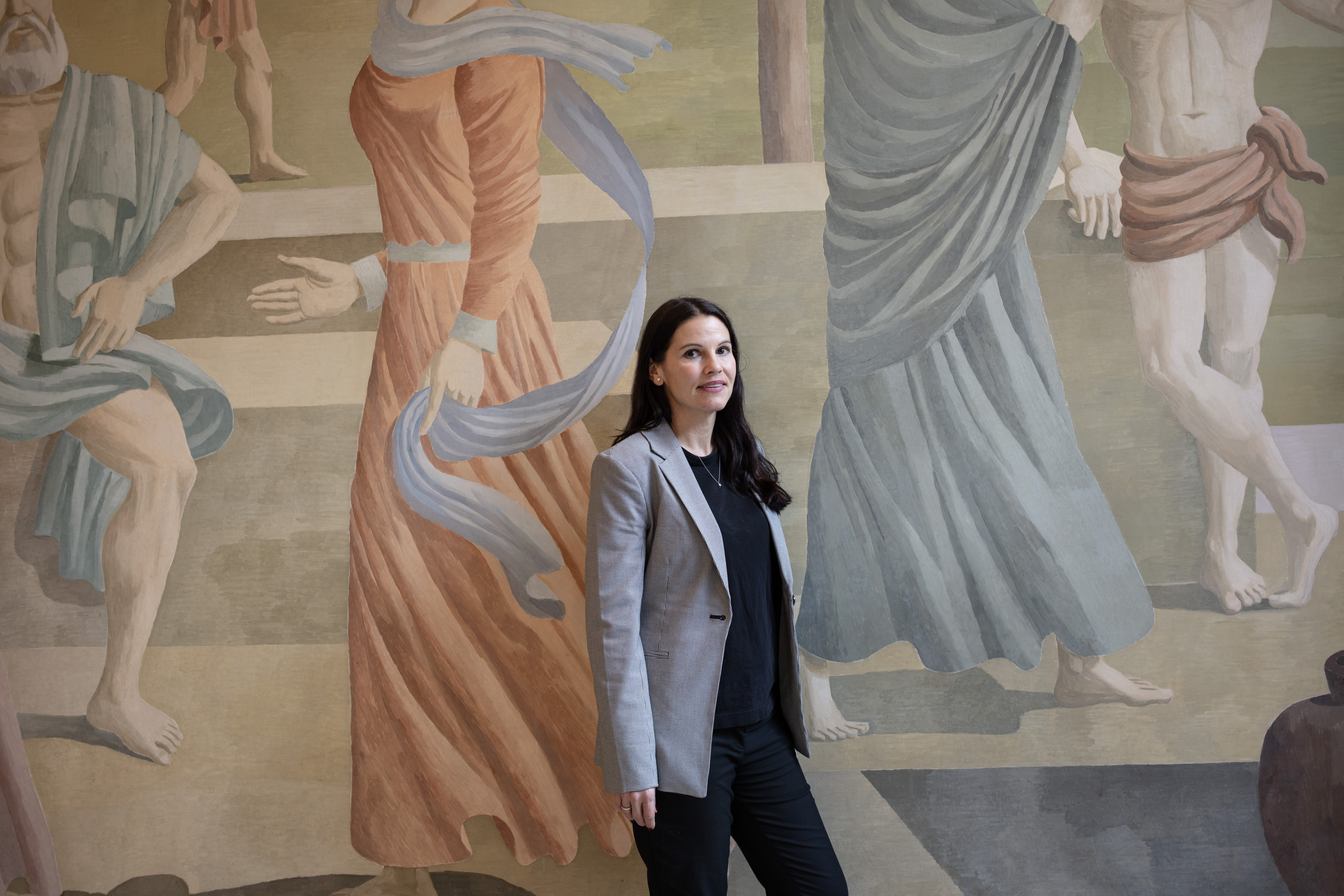
Nina Fehr Düsel lives the life of a modern woman but supports the hardliner values of the conservative Swiss People’s Party. How does this go together?
Surnames like Giezendanner, Wasserfallen, Blocher or, as a matter of fact, Fehr are common in the Swiss parliament, where a handful of members follow in their fathers’ footsteps. The hardest thing for these offsprings is to get out of their fathers’ shadows and make their own mark.
Fehr Düsel is not worried about that. Of course, she is her father’s daughter, but the 43-year-old is convinced that she will get out of his shadow eventually. It is only a matter of time. Her father Hans Fehr, a staunch hardliner of the Swiss People’s Party, focused on immigrants: Eritreans, Kosovars and above all Muslims. He always had foreigners in mind. When in 2015 he left the House of Representatives in Bern after 20 years, his daughter Nina entered the Zurich cantonal parliament.
In 2023, Fehr Düsel entered the House of Representatives where she has already made a splash in her own right. She is generally perceived as less tough than her father. But during the Covid-19 pandemic, she found her niche topic and caused a stir by advocating against mandatory face masks for school children.
Pleasant demeanour
“Anyone who thinks that my path was predestined is wrong,” Fehr Düsel says. It is not necessarily an advantage to have a father who is a hardliner, especially when he is a member of your party. “It is important to create your own style.”
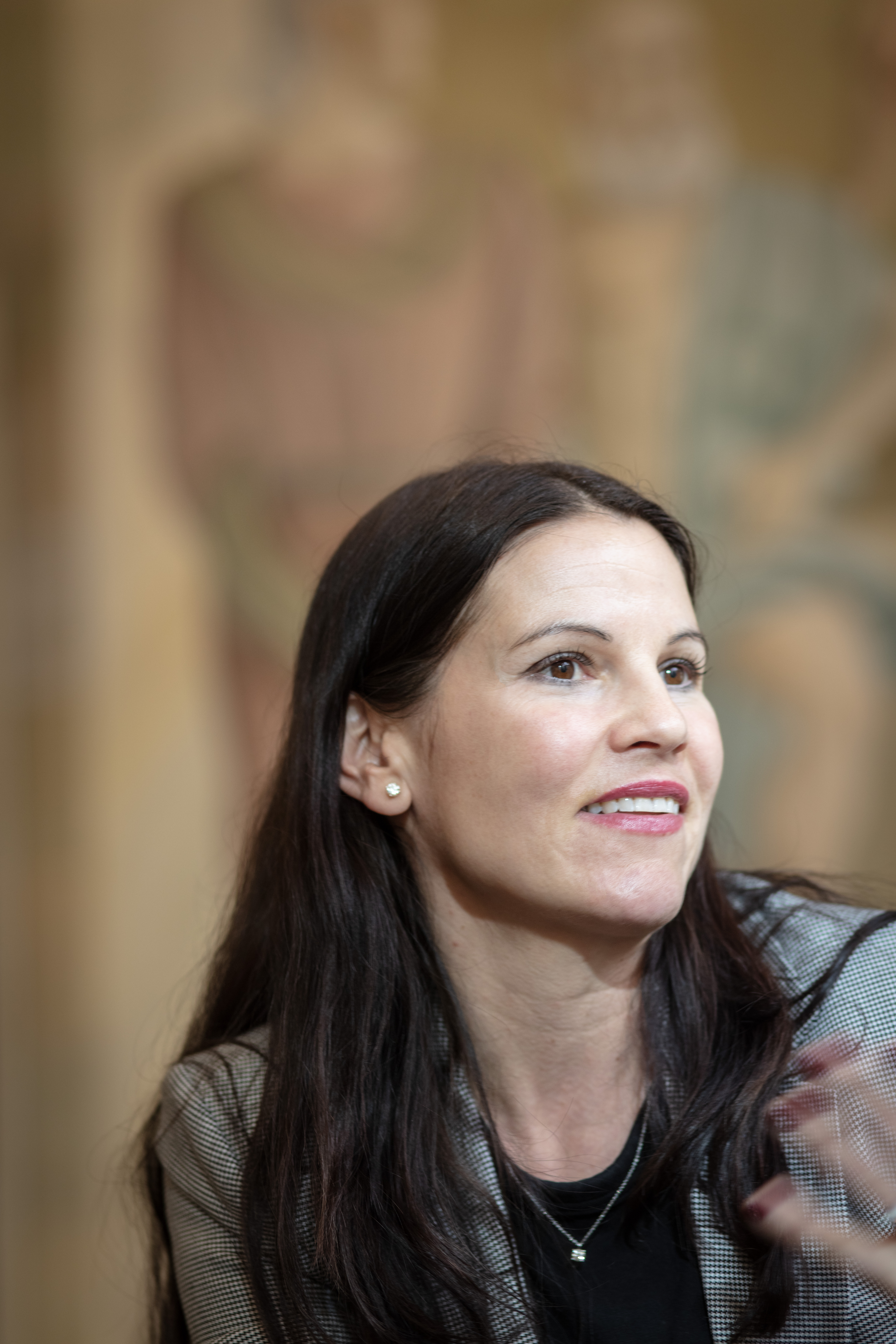
So, what’s her style? Everyone who knows her describes her as efficient and warm-hearted. She is also known for her pleasant demeanour which shines through in any conversation you have with her. If she is told that she is wrong, her usual retort is: “well, there are different ways to look at it.” This is how she wins people over.
The centrist parliamentarian Nicole Barandun has known Fehr Düsel for years and describes her as open and willing to learn. “At the beginning it is never clear which position she will take.”
Her attitude towards Swiss expats goes back to the time when she worked as a flight attendant after graduating from high school. On board, she met many Swiss emigrants and realised that some of them nurtured a special relationship with Switzerland. “For this reason, they should be allowed to keep their Swiss passport and the right to vote,” she says. In general, she sees a problem with dual citizenship, “but it is different for Swiss expats”.
‘Everything comes easily’
Outside political life, Fehr Düsel works in the flash offices of Swiss Life, Switzerland’s biggest insurance company with an annual turnover of CHF20 billion ($23 billion). The insurer with headquarters in one of Zurich’s prime locations on the shores of Lake Zurich is part of the city’s prestigious financial sector. With her firm handshake, relaxed posture and authoritative but friendly demeanour, Fehr Düsel has made it to the upper echelon of Swiss Life’s legal department.
Whenever something goes wrong at Swiss Life, it usually ends up on her desk, be it customer relations, internal inquiries or legal questions around real estate issues. Anyone who works here has made a career.
“My career did not move that fast,” she said. But everyone progresses at some point, and that was important to her too.
Her father, Hans Fehr, disagrees: “She made quick progress: family, home ownership and in-house lawyer. You get the impression that everything comes easily to her.” Fehr says that his daughter had always been very confident and likes to push her limits. “She says ‘I can do it’ and then gets on with it.”
Heart for animals
While her professional path was clear, her political career was rather unintentional. “I thought it was enough if my dad was politically active. I wanted to concentrate on my job,” she says. But after the party leadership asked her to join, things fell into place. “You can’t plan politics.”
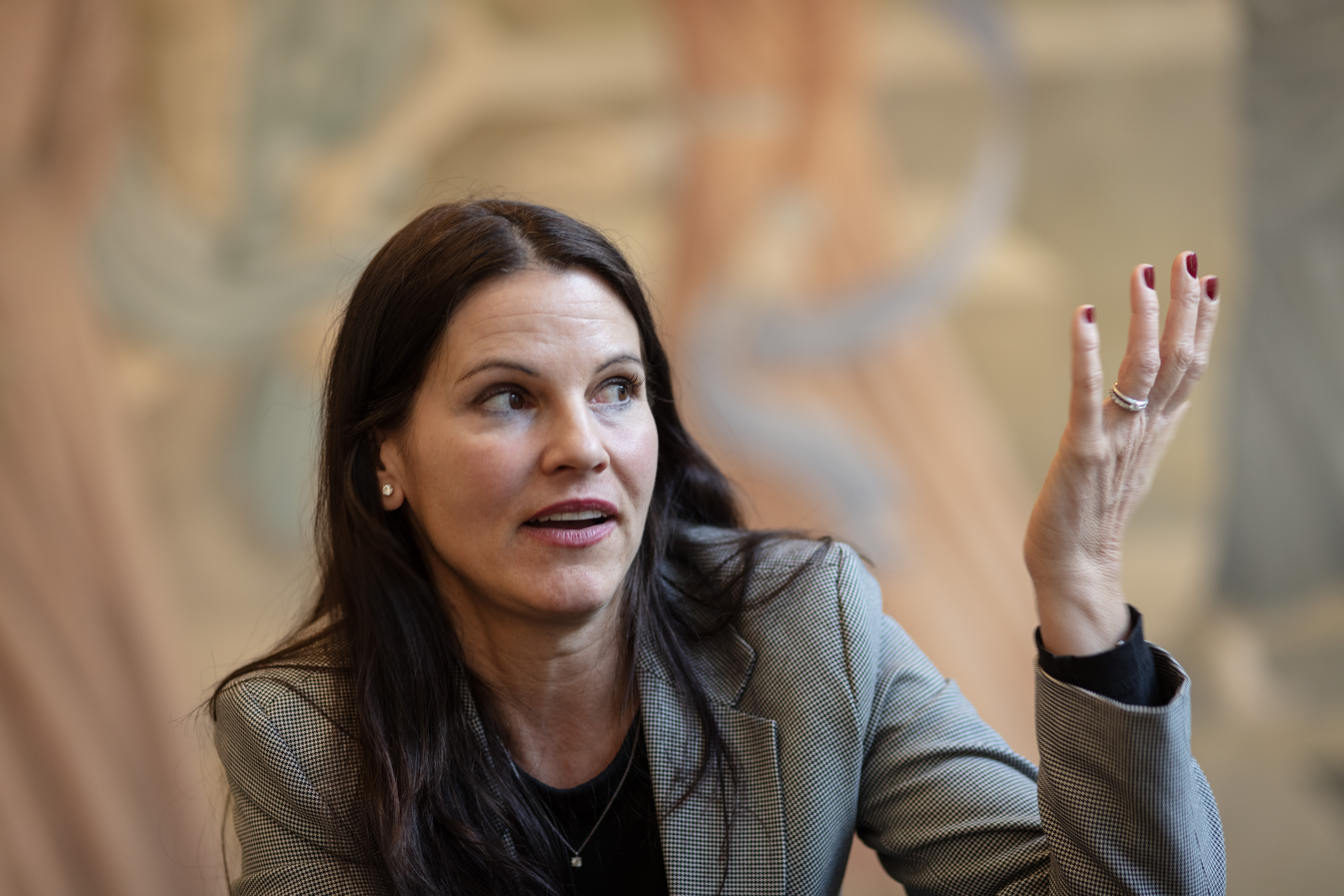
Long before her professional and political career, Fehr Düsel tasted success as an activist. At primary school, she launched a petition against dolphinariums in Switzerland and together with her peers collected 100,000 signatures. “This kindled my interest in politics because I realised that individuals could make a difference in Switzerland,” she says.
At high school, some of her teachers with right-wing and left-wing views made an impression on her. “At this age, you like being rebellious,” she notes. In 1994, she told the bi-monthly magazine Beobachter that, if at all, she was most likely to campaign for the Green Party. “This was a typical thing to do for a pubescent teenager,” her father says. Another typical teenage thing to do was when, at 17, she took part in a modelling contest and came third.
Path to the People’s Party
Her sympathies with the Swiss People’s Party’s values came much later, with work. “I realised how people exploited Switzerland and saw cases of domestic violence. Or how foreigners lied about their origins,” she says. Of course, these were all isolated cases, but they were formative.
Another formative time was when she lived in the suburbs of Paris, where she completed part of her studies. She witnessed crime, even at university, and run-down neighbourhoods. She no longer felt safe. “I no longer liked travelling on local trains. There were a lot of Algerians, and I observed a few things which I did not want to see in Switzerland,” she says. When she returned from France, she shifted to Lausanne University.
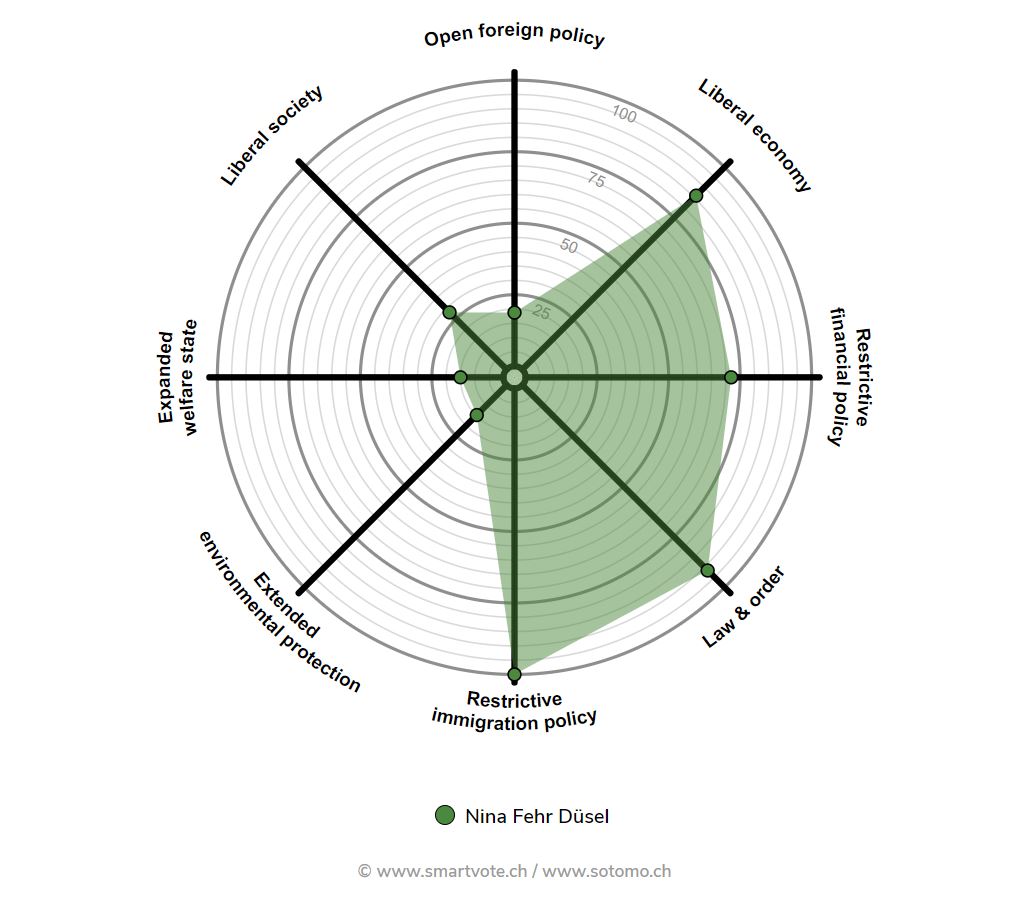
Sounds like her father
Today, the newly appointed People’s Party parliamentarian says: “we have to make sure that women can continue to move around freely in the future and do not have to be afraid. If immigration continues like this, it will only be a matter of time before Switzerland has such parallel societies like France.” With these statements she sounds just like her father.
When it comes to immigration or issues surrounding Switzerland’s independence such as the EU or armed neutrality, Fehr Düsel is entirely in line with her party’s policies. The Switzerland she is fighting is exactly where she lives, namely at the Gold Coast on the shores of Lake Zurich. “I like the area around Altdorf in canton Uri where I grew up and where Switzerland was founded – and of course the lower eastern part of Zurich, where I live,” she says.
Her view is more ambivalent when it comes to the city of Zurich where the ever-increasing number of foreigners has had its impact over the past few years. “The Swiss are being pushed out of Zurich,” she says and explains that there were practically only expat children in one of her sons’ school classes in the suburb of Küsnacht, where she lives. “Some parents don’t even speak German.” These, she continues, may be desired immigrants, but still, it is all a question of numbers.
Modern woman
Nevertheless, on some issues, like energy policies, she is more open than the rest of her party. “We must embrace new solutions,” she says. Unlike many of her party peers, she considers climate change as partly man-made. “It worries me, and I believe that we have an influence.”
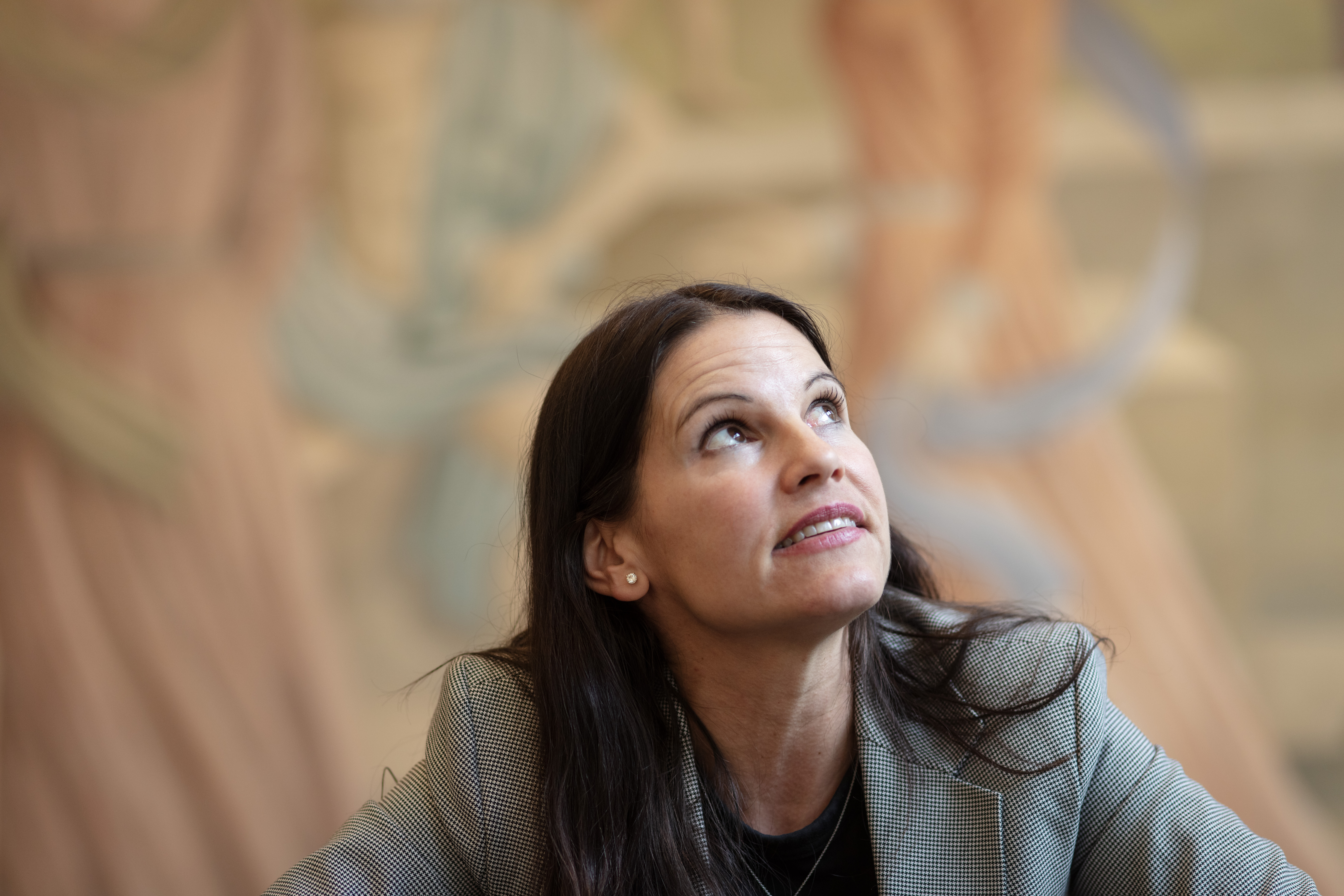
The biggest rift between her and her party’s ideology is her lifestyle. Her work-life balance does not fit in with the party’s conservative image of women. A member of parliament since autumn 2023, Fehr Düsel, mother of seven- and eight-year-old boys, works part-time.
For this reason, her peers describe her as a woman who moves with the times. “She is very modern when it comes to social-political issues,” says Radical-Liberal parliamentarian Bettina Balmer who has worked with her in politics in Zurich for many years. One example is that Fehr Düsel wants to introduce a ban on mobile phones in schools because children need to be protected from the “pull of the digital world”.
Ultra-feminist message
Political peer Nicole Barandun, also a working mother, observes: “you need a partner who supports you along the way. If only because many events take place in the evenings.”
Her husband Thomas Düsel also works part-time. As a management consultant he has the liberty to choose his own working hours. This clear distribution of roles – job and children, hand in hand – has made headlines. The German-speaking weekly newspaper Die Sonntagszeitung wrote: “Even though Fehr Düsel does not describe herself as a feminist, her message is ultra-feminist.”
At the same time, she is a declared opponent of gender-neutral language. Switzerland, she says, has bigger fish to fry and once again mentions immigration.
Edited by Mark Livingston; adapted from German by Billi Bierling/ds

In compliance with the JTI standards
More: SWI swissinfo.ch certified by the Journalism Trust Initiative













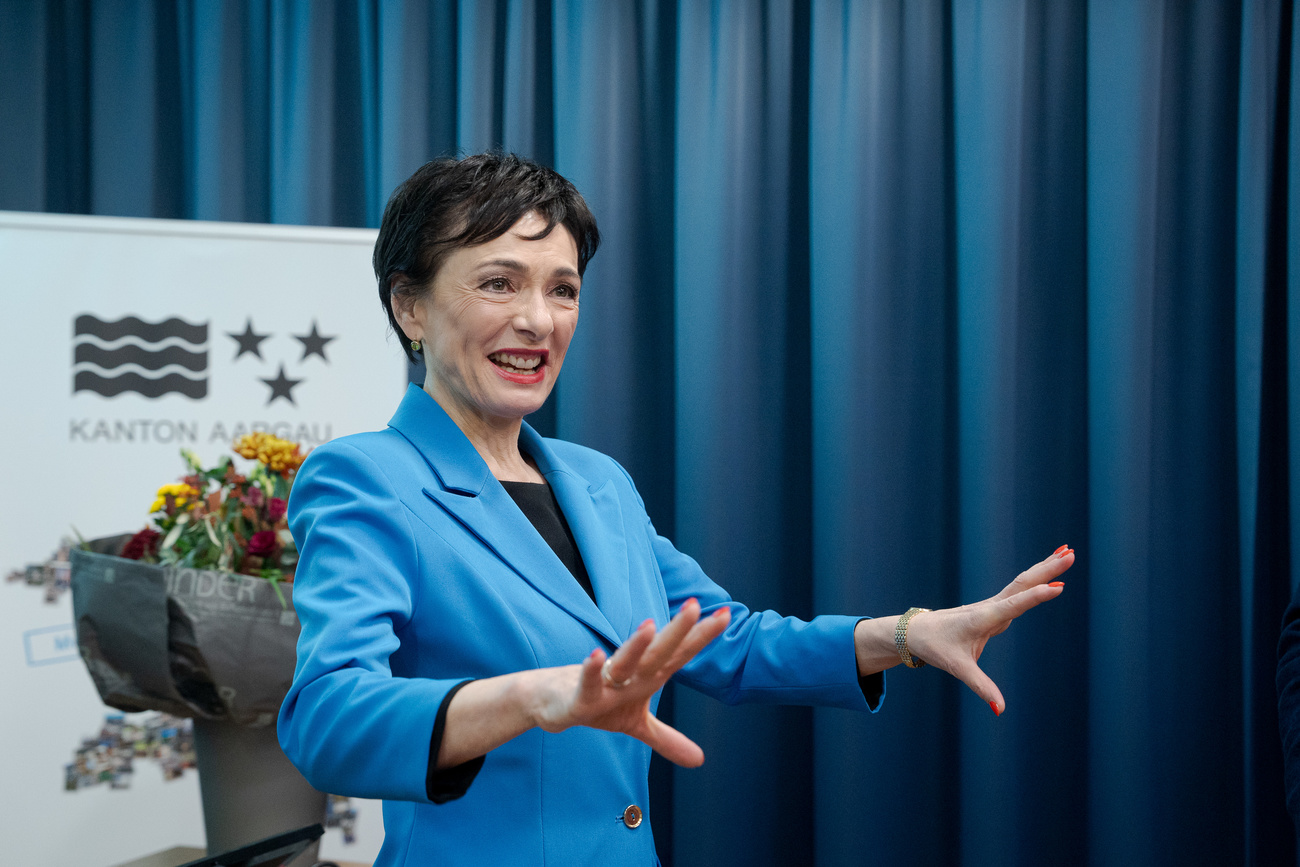
You can find an overview of ongoing debates with our journalists here . Please join us!
If you want to start a conversation about a topic raised in this article or want to report factual errors, email us at english@swissinfo.ch.